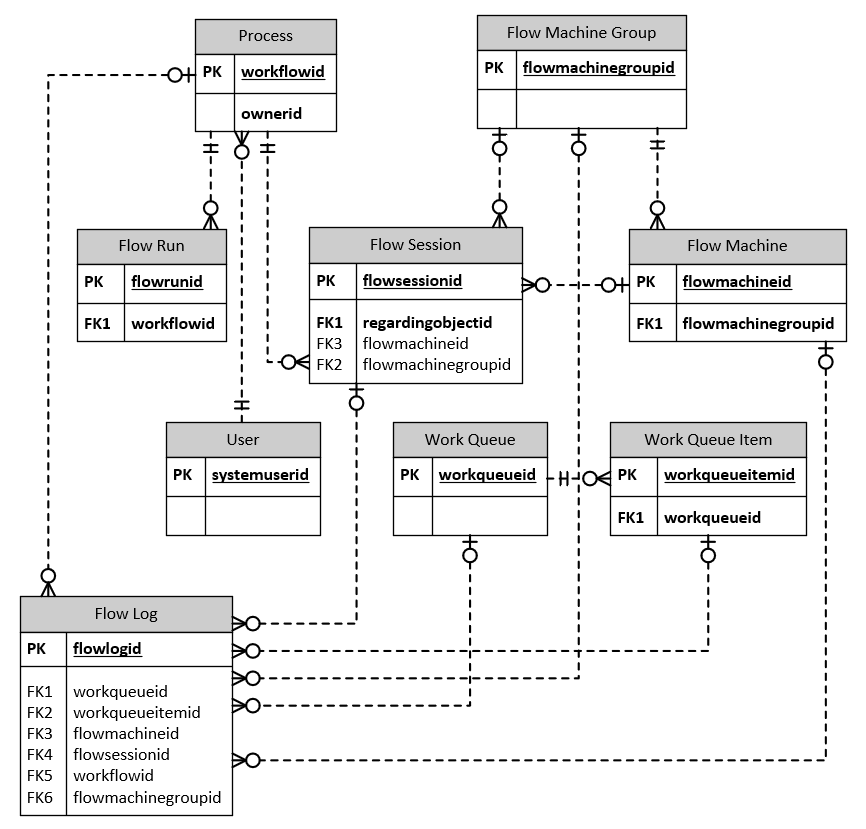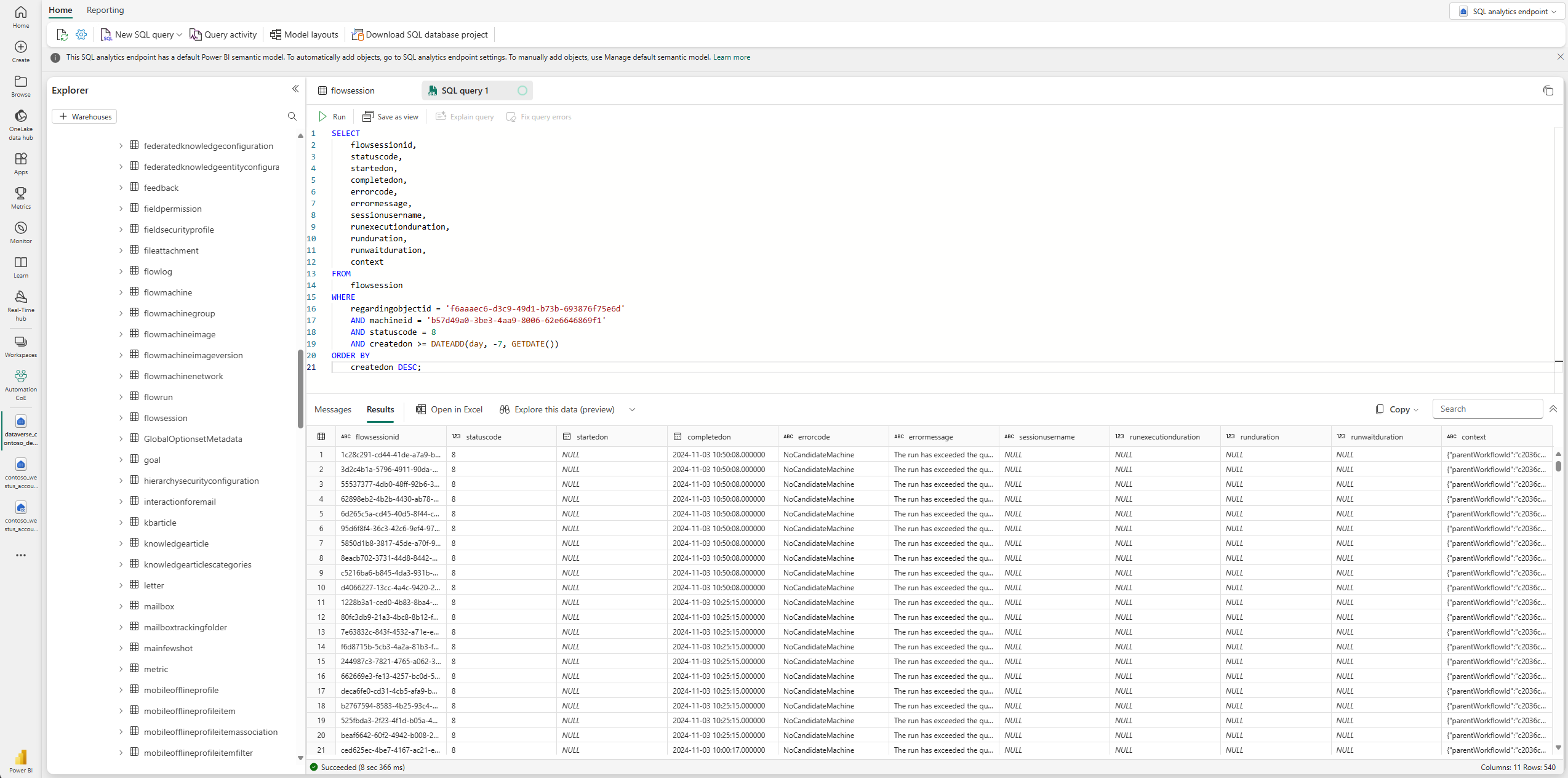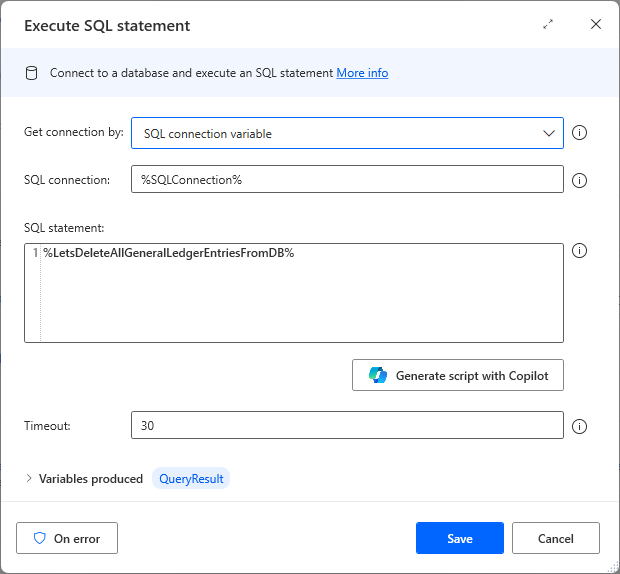Note
Access to this page requires authorization. You can try signing in or changing directories.
Access to this page requires authorization. You can try changing directories.
Note
Disclaimer: The scenarios, query examples, and data used in this tutorial are fictional, may include errors, inefficiencies, and are intended solely for demonstration purposes.
List of automation-related tables
The following table lists automation-related tables frequently used for reporting and observability.
| Display name | Object name | Purpose |
|---|---|---|
| Flow Log | flowlog | Contains a wide variety of logs, such as custom logs, desktop flow action logs V2, machine run queue logs, unattended self-heal requests/responses, and work queue processing logs etc. The data is stored in a Dataverse elastic table, and depending on the log type, can be configured with its own time-to-live (TTL) setting in the Organization table (FlowLogsTtlInMinutes and DesktopFlowQueueLogsTtlInMinutes), which defines when records should be automatically deleted from the table. |
| Flow Machine | flowmachine | Contains machine and hosted machine-related info. |
| Flow Machine Group | flowmachinegroup | Contains machine group and hosted machine group-related info. |
| Flow Run | flowrun | Contains cloud flow run-related data such start, end, duration, parent flow context etc. |
| Flow Session | flowsession | Contains desktop flow run-related data such as start, durations, status, machine, robot account, parent flow context etc. |
| Process | workflow | Contains desktop flows and solution-based cloud flows (along with other workflow types). |
| User | systemuser | Represents the Dataverse user. |
| Work Queue | workqueue | Represents an instance of a workflow execution. |
| Work Queue Item | workqueueitem | Contains information about each run of a workflow. |
Simplified table relationship diagram
The image shows only the relevant table relations for automation.
Create your first query in Fabric
Follow these steps to create a sample SQL query on the SQL Analytical Endpoint in Fabric for the contoso_westus_accounts_payable Lakehouse.
Open your web browser, go to the Microsoft Fabric portal (https://powerbi.com), and sign in with your credentials.
Select the workspace where your Lakehouse is located, then select the desired SQL Analytical Endpoint (a subnode of your Lakehouse).
In the SQL Analytical Endpoint, select New SQL query to open the SQL query editor.
In the SQL query editor, enter your SQL query and select Run. The following example query retrieves all desktop flow runs (flow sessions) associated with a specific desktop flow and a machine ID that failed within the last seven days.
SELECT flowsessionid, statuscode, startedon, completedon, errorcode, errormessage, sessionusername, runexecutionduration, runduration, runwaitduration, context FROM flowsession WHERE regardingobjectid = '[specific_flow_id]' -- Replace with the actual flow ID AND machineid = '[specific_machine_guid]' -- Replace with the actual machine ID AND statuscode = 8 -- 'Failed' sessions AND createdon >= DATEADD(day, -7, GETDATE()) ORDER BY createdon DESC;Here's a list of available status reasons (statuscode) for the
Flow Sessions(desktop flow runs) table.Status reason Value Paused 1 Running 2 Waiting 3 Succeeded 4 Skipped 5 Suspended 6 Canceled 7 Failed 8 Faulted 9 TimedOut 10 Aborted 11 Ignored 12 Review the query results to ensure they meet your needs.
(Optional) Open a Live-query with results in Excel by highlighting the SQL query and selecting Open in Excel in the query output section. This generates and downloads an Excel file with a Live-query to the SQL Analytics endpoint for further analysis.
(Optional) To store the SQL query for future use, select Save Query.
Basic flow queries
Retrieve cloud flows with their owner info
This query returns all cloud flows with their owner information.
Note
Only cloud flows that are part of a Dataverse solution are available in Fabric.
SELECT
w.name AS 'Cloud flow',
w.workflowid AS 'Cloud flow Id',
w.createdon AS 'Created on',
w.modifiedon AS 'Last modified on',
w.clientdata AS 'Script',
w.ownerid AS 'Owner Id',
s.fullname AS 'Owner name',
s.internalemailaddress AS 'Owner email'
FROM
workflow w
JOIN
systemuser s ON w.ownerid = s.systemuserid
WHERE
w.category = 5; -- Only consider solution-cloud flows (category 5)
Retrieve desktop flows with their owner info
This query returns all desktop flows with their owner information.
SELECT
w.name AS 'Desktop flow',
w.workflowid AS 'Desktop flow Id',
w.createdon AS 'Created on',
w.modifiedon AS 'Last modified on',
w.definition AS 'Script',
w.ownerid AS 'Owner Id',
s.fullname AS 'Owner name',
s.internalemailaddress AS 'Owner email'
FROM
workflow w
JOIN
systemuser s ON w.ownerid = s.systemuserid
WHERE
w.category = 6; -- Only consider desktop flows (category 6)
Performance-related query example
This query retrieves the minimum, mean (average), maximum, and standard deviation of runtimes for desktop flow runs (Flow Sessions) of a specified desktop flow, with the runtimes converted from milliseconds rounded up to the nearest full second. The query groups the results by machine IDs and includes details such as machine names, management types, maximum hosted machine counts, session capacity, and the last heartbeat date from the Machine Group and Machine tables.
SELECT
f.machineid,
fm.name AS machine_name,
CASE
WHEN mg.managementtype = 0 THEN 'Regular Machine (Group)'
ELSE 'Hosted Machine (Group)'
END AS managementtype,
mg.maxmanagedmachinecount AS maxmanagedmachinecount,
fm.lastheartbeatdate AS last_heartbeat_date,
fm.sessioncapacity AS 'Max Parallel Sessions',
CEILING(MIN(f.runduration) / 1000.0) AS min_runtime,
CEILING(AVG(f.runduration) / 1000.0) AS mean_runtime,
CEILING(MAX(f.runduration) / 1000.0) AS max_runtime,
CEILING(STDEV(f.runduration) / 1000.0) AS stdev_runtime
FROM
flowsession f
JOIN
flowmachinegroup mg ON f.machinegroupid = mg.flowmachinegroupid
JOIN
flowmachine fm ON f.machinegroupid = fm.flowmachinegroupid
WHERE
f.regardingobjectid = '[specific_flow_id]' -- Replace with the actual flow ID
GROUP BY
f.machineid, fm.name, mg.managementtype, mg.maxmanagedmachinecount, fm.lastheartbeatdate, fm.sessioncapacity
ORDER BY
mean_runtime DESC;
Machine and licensing capacity-related query
This query identifies machine and licensing-related capacity issues for a specific desktop flow to help in optimizing resource allocation and addressing performance constraints.
SELECT
f.machineid,
fm.name AS machine_name,
CASE
WHEN mg.managementtype = 0 THEN 'Regular Machine (Group)'
ELSE 'Hosted Machine (Group)'
END AS managementtype,
mg.maxmanagedmachinecount AS maxmanagedmachinecount,
fm.lastheartbeatdate AS last_heartbeat_date,
fm.sessioncapacity AS 'Max Parallel Sessions',
fm.overcapacitysince,
CASE
WHEN fm.overcapacitysince IS NOT NULL THEN 'Over Capacity'
ELSE 'Within Capacity'
END AS capacity_status
FROM
flowsession f
JOIN
flowmachinegroup mg ON f.machinegroupid = mg.flowmachinegroupid
JOIN
flowmachine fm ON f.machinegroupid = fm.flowmachinegroupid
WHERE
f.regardingobjectid = '[specific_flow_id]' -- Replace with the actual flow ID
GROUP BY
f.machineid, fm.name, mg.managementtype, mg.maxmanagedmachinecount, fm.lastheartbeatdate, fm.sessioncapacity, fm.overcapacitysince
ORDER BY
capacity_status DESC, fm.lastheartbeatdate DESC;
Governance-related query examples for desktop flows
Find scripts that include plain text passwords in connections
This query finds all desktop flows that use (OLEDB) database connection strings that are configured to use a plaintext password.
SELECT
w.name AS 'Desktop flow',
w.workflowid AS 'Desktop flow Id',
w.createdon AS 'Created on',
w.modifiedon AS 'Last modified on',
w.definition AS 'Script',
w.ownerid AS 'Owner Id',
s.fullname AS 'Owner name',
s.internalemailaddress AS 'Owner email'
FROM
workflow w
JOIN
systemuser s ON w.ownerid = s.systemuserid
WHERE
w.category = 6
AND w.definition IS NOT NULL
AND (LOWER(w.definition) LIKE '%;password=%');
Potential SQL injection risk
The query detects desktop flows that contain scripts potentially vulnerable to SQL injection by searching for the use of database.executesqlstatement.execute within the flow definitions. Consider a scenario where, instead of directly writing the SQL code in the Execute SQL statement action, the script uses a Power Automate desktop input variable (for example, %LetsDeleteAllGeneralLedgerEntriesFromDB%) provided to the script during runtime.
SELECT
w.name AS 'Desktop flow',
w.workflowid AS 'Desktop flow Id',
w.createdon AS 'Created on',
w.modifiedon AS 'Last modified on',
w.definition AS 'Script',
w.ownerid AS 'Owner Id',
s.fullname AS 'Owner name',
s.internalemailaddress AS 'Owner email'
FROM
workflow w
JOIN
systemuser s ON w.ownerid = s.systemuserid
WHERE
w.category = 6
AND w.definition IS NOT NULL
AND LOWER(w.definition) LIKE '%database.executesqlstatement.execute%';
Advance API request usage
This query retrieves desktop flows that utilize advanced API request methods, such as curl, Invoke-RestMethod, and other requests, to identify connectivity to external web services or services.
SELECT
w.name AS 'Desktop flow',
w.workflowid AS 'Desktop flow Id',
w.createdon AS 'Created on',
w.modifiedon AS 'Last modified on',
w.definition AS 'Script',
w.ownerid AS 'Owner Id',
s.fullname AS 'Owner name',
s.internalemailaddress AS 'Owner email'
FROM
workflow w
JOIN
systemuser s ON w.ownerid = s.systemuserid
WHERE
w.category = 6
AND w.definition IS NOT NULL
AND (
LOWER(w.definition) LIKE '%curl%' OR
LOWER(w.definition) LIKE '%invoke-restmethod%' OR
LOWER(w.definition) LIKE '%invoke-webrequest%' OR
LOWER(w.definition) LIKE '%httpclient%' OR
LOWER(w.definition) LIKE '%requests.get%' OR
LOWER(w.definition) LIKE '%requests.post%' OR
LOWER(w.definition) LIKE '%fetch%' OR
LOWER(w.definition) LIKE '%axios%' OR
LOWER(w.definition) LIKE '%.ajax%'
);
Web endpoints and URL shortcuts usage
This query detects desktop flows containing scripts that reference URL shorteners to assess potential risks of restricted URL usage.
SELECT
w.name AS 'Desktop flow',
w.workflowid AS 'Desktop flow Id',
w.createdon AS 'Created on',
w.modifiedon AS 'Last modified on',
w.definition AS 'Script',
w.ownerid AS 'Owner Id',
s.fullname AS 'Owner name',
s.internalemailaddress AS 'Owner email'
FROM
workflow w
JOIN
systemuser s ON w.ownerid = s.systemuserid
WHERE
w.category = 6
AND w.definition IS NOT NULL
AND (
LOWER(w.definition) LIKE '%bit.ly%' OR
LOWER(w.definition) LIKE '%linkedin.com%' OR
LOWER(w.definition) LIKE '%aka.ms%' OR
LOWER(w.definition) LIKE '%tinyurl.com%' OR
LOWER(w.definition) LIKE '%goo.gl%' OR
LOWER(w.definition) LIKE '%t.co%' OR
LOWER(w.definition) LIKE '%fb.me%' OR
LOWER(w.definition) LIKE '%is.gd%' OR
LOWER(w.definition) LIKE '%buff.ly%'
);
Missing error handling in scripts
This query searches for desktop flows that lack any error handling mechanisms, such as on block error or on error, to ensure robustness and reliability in script execution.
SELECT
w.name AS 'Desktop flow',
w.workflowid AS 'Desktop flow Id',
w.createdon AS 'Created on',
w.modifiedon AS 'Last modified on',
w.definition AS 'Script',
w.ownerid AS 'Owner Id',
s.fullname AS 'Owner name',
s.internalemailaddress AS 'Owner email'
FROM
workflow w
JOIN
systemuser s ON w.ownerid = s.systemuserid
WHERE
w.category = 6
AND w.definition IS NOT NULL
AND NOT (LOWER(w.definition) LIKE '%on block error%' OR LOWER(w.definition) LIKE '%on error%');
Governance-related query examples for V2 action logs
Note
Before you continue with this section, ensure that Desktop Flow Logs V2 has been enabled in your environment and that you have existing desktop flow runs.
Desktop flow runs with restricted URL access
This query finds web service invocations (Invoke Web Service action) within a specific desktop flow over the past three weeks. This result is useful for identifying and analyzing potentially suspicious endpoints or restricted API calls.
SELECT
JSON_VALUE(f.data, '$.name') AS ActionName,
f.data AS 'Action log',
f.parentobjectid AS 'Parent object id',
f.createdon AS 'Log created on',
w.name AS 'Desktop flow',
w.workflowid AS 'Desktop flow Id',
w.createdon AS 'Created on',
w.modifiedon AS 'Last modified on',
w.definition AS 'Script',
w.ownerid AS 'Owner Id',
s.fullname AS 'Owner name',
s.internalemailaddress AS 'Owner email'
FROM
[flowlog] f
JOIN flowsession fs ON f.parentobjectid = fs.flowsessionid
JOIN workflow w ON fs.regardingobjectid = w.workflowid
JOIN systemuser s ON w.ownerid = s.systemuserid
WHERE
w.workflowid = '[specific_flow_id]' -- Replace with the actual flow ID
AND f.createdon >= DATEADD(day, -21, GETDATE())
AND JSON_VALUE(f.data, '$.name') = 'Invoke web service'
AND (
f.data LIKE '%contoso-default.crm.dynamics.com/api%'
OR f.data LIKE '%api.second-restricted-url.net%'
OR f.data LIKE '%api.third-restricted-url.de%'
OR f.data LIKE '%api.phishing-example.com%'
);
Desktop flow runs with cryptographic code
This query scans desktop flow runs for PowerShell script actions that included cryptographic code over the past seven days.
-- Queries actions logs named 'Run PowerShell script' that contain code that that uses cryptographic libraries
-- and terms such as "AES", "RSA", "encryption", or "decryption," which may indicate risky operations
SELECT top(1)
JSON_VALUE(data, '$.name') AS ActionName,
JSON_VALUE(data, '$.inputs') AS Inputs,
JSON_VALUE(data, '$.outputs') AS Outputs
FROM
[flowlog]
WHERE
JSON_VALUE(data, '$.name') = 'Run PowerShell script'
AND createdon >= DATEADD(day, -7, GETDATE())
AND (
JSON_VALUE(data, '$.inputs') LIKE '%AES%'
OR JSON_VALUE(data, '$.inputs') LIKE '%RSA%'
OR JSON_VALUE(data, '$.inputs') LIKE '%encryption%'
OR JSON_VALUE(data, '$.inputs') LIKE '%decryption%'
)
ORDER BY
ActionName
Desktop flow runs with pro-code usage
This query is a bit more advanced. It identifies and counts distinct desktop flow runs (Flow Sessions) with pro-coding parts (such as VBScript, PowerShell, JavaScript, .NET, or Python) from the last seven days, and groups the results by desktop flow.
WITH ProCodingSessions AS (
SELECT
fs.flowsessionid,
f.data AS 'Action log',
f.parentobjectid AS 'Parent object id',
f.createdon AS 'Log created on',
w.name AS 'Desktop flow',
w.workflowid AS 'Desktop flow Id',
w.createdon AS 'Created on',
w.modifiedon AS 'Last modified on',
w.definition AS 'Script',
w.ownerid AS 'Owner Id',
s.fullname AS 'Owner name',
s.internalemailaddress AS 'Owner email'
FROM [flowlog] f
JOIN flowsession fs ON f.parentobjectid = fs.flowsessionid
JOIN workflow w ON fs.regardingobjectid = w.workflowid
JOIN systemuser s ON w.ownerid = s.systemuserid
WHERE f.createdon >= DATEADD(day, -7, GETDATE())
AND (
LOWER(w.definition) LIKE '%runvbscript%' OR
LOWER(w.definition) LIKE '%runpowershellscript%' OR
LOWER(w.definition) LIKE '%runjavascript%' OR
LOWER(w.definition) LIKE '%rundotnetscript%' OR
LOWER(w.definition) LIKE '%runpythonscript%'
)
),
FlowCounts AS (
SELECT
p.[Desktop flow],
p.[Desktop flow Id],
p.[Created on],
p.[Last modified on],
p.[Script],
p.[Owner Id],
p.[Owner name],
p.[Owner email],
COUNT(DISTINCT p.flowsessionid) AS ProCodingSessionCount
FROM ProCodingSessions p
GROUP BY
p.[Desktop flow],
p.[Desktop flow Id],
p.[Created on],
p.[Last modified on],
p.[Script],
p.[Owner Id],
p.[Owner name],
p.[Owner email]
)
SELECT
f.[Desktop flow],
f.[Desktop flow Id],
f.[Created on],
f.[Last modified on],
f.[Script],
f.[Owner Id],
f.[Owner name],
f.[Owner email],
f.ProCodingSessionCount AS 'Runs with pro-code'
FROM FlowCounts f
ORDER BY f.ProCodingSessionCount DESC;
Error and perfromance-related queries for V2 action logs
Top 10 failing desktop flow actions
This query returns the top 10 failing actions by number of errors over the past seven days.
SELECT TOP(10)
JSON_VALUE(data, '$.name') AS ActionName,
SUM(CASE WHEN JSON_VALUE(data, '$.status') = 'Failed' THEN 1 ELSE 0 END) AS ErrorCount
FROM [flowlog]
WHERE createdon >= DATEADD(day, -7, GETDATE())
GROUP BY JSON_VALUE(data, '$.name')
HAVING SUM(CASE WHEN JSON_VALUE(data, '$.status') = 'Failed' THEN 1 ELSE 0 END) > 0
ORDER BY ErrorCount DESC;
Top 10 error codes with count
SELECT TOP(10)
JSON_VALUE(data, '$.errorCode') AS ErrorCode,
COUNT(*) AS OccurrenceCount
FROM [flowlog]
WHERE createdon >= DATEADD(day, -7, GETDATE())
AND JSON_VALUE(data, '$.status') = 'Failed'
GROUP BY JSON_VALUE(data, '$.errorCode')
ORDER BY OccurrenceCount DESC;




